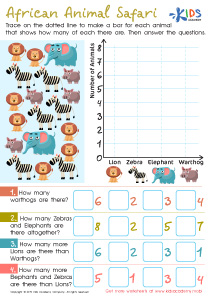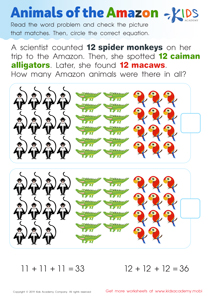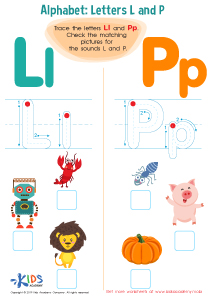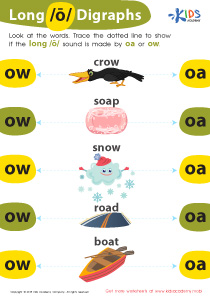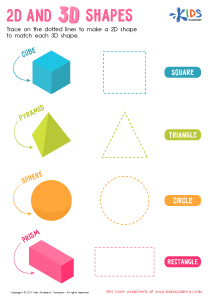Easy Addition Story Problems (#'s 1-5) Quizzes for Ages 3-4
2 results
2 filtered results
Clear all filters2 filtered results
-
From - To
Unleash the joy of learning with our Easy Addition Story Problems (#'s 1-5) for Ages 3-4! Designed to captivate the curious minds of young learners, this interactive quiz collection offers a delightful journey into the world of basic addition. Through engaging story problems tailored specifically for children ages 3 to 4, our quizzes not only check their understanding but also provide constructive feedback to encourage progress. Whether it's adding apples in a basket or counting cookies on a plate, these story problems make learning a fun and immersive experience. Watch your child's confidence in math bloom with every quiz they complete!
In the world of early childhood education, the introduction of mathematics can either spark a lifetime of curiosity or, unfortunately, create hurdles. Recognizing this critical juncture, our Easy Addition Story Problems (#'s 1-5) for Ages 3-4 have been meticulously crafted to ensure young learners embark on their mathematical journey with enthusiasm, understanding, and confidence. These interactive quizzes are not just educational tools but gateways to a world where numbers tell stories, and problem-solving becomes an adventure.
At first glance, mathematics might seem daunting to preschoolers, but through the lens of story problems, numbers transform into characters, and equations turn into narratives. This narrative approach is pivotal, especially for children aged 3 to 4, as it aligns with their cognitive development stage, where stories and play are primary modes of learning. Easy Addition Story Problems (#'s 1-5) seamlessly blend these elements, turning math lessons into engaging, interactive sessions where learning feels like play.
Why are these story-based quizzes so effective for this age group? Firstly, they are designed with the young learner in mind. The problems are not abstract puzzles but relatable scenarios that children might encounter in their daily lives, such as sharing snacks with friends or counting toys. This relevance boosts their interest and motivation, making the learning process natural and enjoyable.
Secondly, the interactive element of the quizzes enhances engagement. Children love interacting with digital content, and when this interaction is educational, it's a win-win. The immediate feedback provided in these quizzes helps children understand their mistakes and learn from them in real time, fostering a growth mindset from an early age. This feedback loop is crucial for building confidence in their problem-solving skills, a foundation that will benefit them in all areas of learning.
Moreover, these Easy Addition Story Problems (#'s 1-5) are more than just arithmetic exercises; they are tools for developing critical thinking and comprehension skills. By listening to or reading the stories, children practice their language skills, and by solving the problems, they learn to apply logic and reasoning. These are comprehensive cognitive exercises wrapped in the guise of simple addition problems, offering a holistic approach to early education.
Another significant advantage of these story problems is their accessibility. Designed for ages 3-4, they ensure that no child feels left behind. The difficulty level is carefully calibrated to challenge young minds without overwhelming them, making it an inclusive tool that caters to a wide range of learning paces and styles. Whether a child is just starting to show interest in numbers or already demonstrating advanced counting skills, these quizzes provide a supportive platform for growth and exploration.
In conclusion, Easy Addition Story Problems (#'s 1-5) for Ages 3-4 are more than just an educational resource; they are a stepping stone toward a lifelong journey of learning and discovery. By making math accessible, interactive, and fun, they lay the groundwork for a positive relationship with learning, setting children up for success not only in mathematics but in their academic and personal lives beyond.
